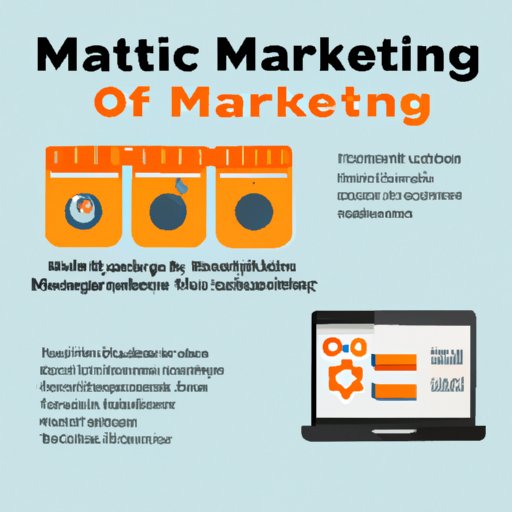Introduction
Marketing automation is a powerful tool for businesses of all sizes. It enables companies to streamline their marketing processes and increase efficiency while providing valuable insights into customer behavior. In this article, we’ll explore what marketing automation is, the benefits it offers, and the basics of implementing successful campaigns.

Exploring the Benefits of Marketing Automation: A Guide
Understanding the power of automated marketing strategies can help businesses make the most of their marketing efforts. Automation allows companies to focus their resources on more effective strategies, while also reducing the time and effort needed to manage campaigns. Here are some of the key benefits of using marketing automation:
- Increased efficiency – Automated marketing processes save time and money by eliminating manual tasks and allowing teams to focus on higher-value activities.
- Improved customer engagement – Automation enables businesses to create personalized customer experiences that drive loyalty and repeat sales.
- Better data collection – Automation makes it easier to collect, analyze, and act on customer data to improve marketing performance.
- Enhanced ROI – Automation helps businesses get the most out of their marketing budget by targeting the right customers at the right time.
The Basics of Implementing Successful Marketing Automation
Once you understand the benefits of marketing automation, it’s time to start planning your strategy. Here are 10 examples of automated marketing strategies you can use to get started:
- Email campaigns – Automated email campaigns allow businesses to send personalized messages to their customers on a regular basis.
- Social media management – Automation tools can be used to schedule posts, engage with followers, and measure social media performance.
- Lead nurturing – Automation can help businesses build relationships with potential customers by delivering relevant content throughout the buyer’s journey.
- Customer segmentation – Automation makes it easy to segment customers based on demographics, interests, or past purchases.
- Campaign tracking – Automation tools provide detailed reports on campaign performance, enabling businesses to optimize their strategies.
- Content optimization – Automation can help businesses deliver the most relevant content to their customers.
- Ad retargeting – Automation can be used to target ads to customers who have previously interacted with a company’s website or content.
- SMS campaigns – Automated SMS campaigns allow businesses to send timely, tailored messages to their customers.
- Cross-channel marketing – Automation makes it easy to manage multiple channels and ensure a consistent message across all platforms.
- CRM integration – Automation can be used to integrate customer data from different sources into one centralized platform.
Once you’ve identified the automated marketing strategies that are right for your business, it’s time to craft an effective plan. Start by defining your goals and objectives and then determine which strategies will help you achieve them. Finally, set up your automation tools and create a timeline for launching and managing your campaigns.

Measuring the Impact of Automated Marketing Campaigns
The final step in any successful marketing automation strategy is measuring the impact of your campaigns. Analyzing data from automated campaigns can provide valuable insights into customer behavior and enable businesses to adjust their strategies accordingly. Some of the key metrics to look at include open rates, click-through rates, conversion rates, and ROI.
It’s also important to evaluate the effectiveness of each individual campaign. Look at which campaigns have driven the most conversions and revenue, as well as which ones have had the highest ROI. This information can help you refine your strategies and ensure that you’re getting the maximum benefit from your marketing automation efforts.
Conclusion
Marketing automation is a powerful tool for businesses of all sizes. It enables companies to streamline their marketing processes and increase efficiency while providing valuable insights into customer behavior. By leveraging the power of automated marketing strategies, businesses can maximize their ROI and ensure that their campaigns are as effective as possible.
With the right approach and the right tools, businesses can take full advantage of the benefits of marketing automation. By understanding the basics of implementation, crafting an effective plan, and measuring the impact of their campaigns, businesses can ensure that their automated marketing efforts are paying off.
(Note: Is this article not meeting your expectations? Do you have knowledge or insights to share? Unlock new opportunities and expand your reach by joining our authors team. Click Registration to join us and share your expertise with our readers.)
